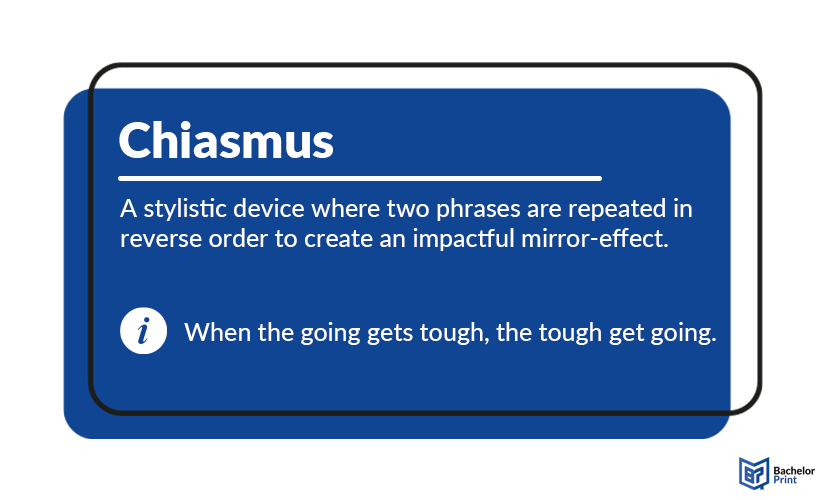
Nowadays, many stylistic devices are rarely used. Most of them sound archaic or unfitting in a sentence structure, or they are difficult to use in academic writing and in general. One example of a stylistic device is “chiasmus.” Although you should be cautious when using it in academic writing, including it in your thesis in a modern way can elevate the text. In the following article, “chiasmus” will be explained, defined, and illustrated with examples.
Definition: Chiasmus
Chiasmus, sometimes also referred to as chiasm, is pronounced as “ky-AZ-muhs.” It describes a figure of speech where the grammatical structure of a sentence is mirrored in the next one. The structure needs to be symmetrical, but the length of the phrases can vary. The term chiasmus derives from the Greek letter X called “chi” or the whole word “chiasmos,” meaning “placed crosswise.”
It is important, however, that the sentences are contextually linked. Otherwise, the stylistic device will not be recognised as such and will sound nonsensical. The following examples of chiasm will give you a better impression of how it works.

- ✓ 3D live preview of your individual configuration
- ✓ Free express delivery for every single purchase
- ✓ Top-notch bindings with customised embossing

Use and purpose
A chiasm can be used in literature and as a rhetoric device.
In literature
In literature, it is used to create a more stiff or stilted language. Especially in poetry, other effects of chiasmus can also be to emphasize something or create a rhythm in the verses.
In political speeches
Chiasm is also often used in political speeches, especially the special form antimetabole, where the same words are used and switched in the second sentence, the symmetrical structure creates a memorable repetition.
Differences to similar devices
A few other stylistic devices can be easily confused, particularly parallelism and antimetabole. The next paragraphs will outline their differences to help distinguish them.
Parallelism
Parallelism could be called the opposite of a chiasmus. It refers to two sentences with the same grammatical structure. This stylistic device can be found in everyday speech more commonly because the parallel structure makes it easier for the mind to understand than the mirror structure of the chiasm. This is the case because inverse structures can sometimes sound old-fashioned or improper.
In this example, the first sentence places the main clause before the conditional clause, while the second reverses the order, starting with the accessory clause and ending with the main clause.
For parallelism, you can observe that the structure is repeated after the semicolon. The sentences are essentially the same, with only a few words swapped or replaced. This emphasizes the similarity in structure and rhythm.
Antimetabole
Antimetabole is a figure of speech similar to the chiasmus. In this case, however, not the grammatical structure is mirrored, but the order of the words themselves. Some people claim that an antimetabole is a type of chiasm, while stricter definitions say that it is something completely separate.
Here, the words used are almost the same, but the sentence structure is reversed. First, the object “city” comes after the subject and before the action, while in the additional clause, the action of losing herself comes in second place.
The antimetabole could be considered the combination of chiasmus and parallelism. It has the parallel structure of the grammar but the inverse structure of the words. In this case, the repeated structure is “In times of x, prepare for y” and only the words “peace” and “war” are exchanged.
FAQs
Stylistic devices in general have to be interpreted according to the context. There are still a few things that will most likely be the case when a chiasmus is used. For example, it mostly emphasizes things and creates a rhythm, whether this is in poetry or speeches. It can also show a contrast due to the chiastic structure. However, it can just the same highlight a similarity if used in the right way.
A chiasmus reverses the grammatical structure, often the order of subject, verb, and object, while an antimetabole keeps the structure but switches the words. This is why antimetaboles always use the same words, while chiasmus sentences can differ entirely.
A famous example can be found in one of John F. Kennedy’s speeches, where he says: “Let us never negotiate out of fear, but let us never fear to negotiate.” It contains the same words, but he changes the noun to a verb and vice versa.
